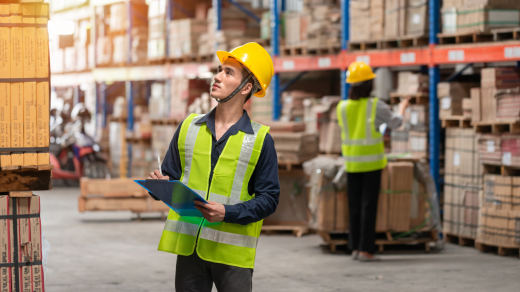Warehouse quality assurance is a critical component of any successful eCommerce business. It’s the process of ensuring that the products you’re shipping are in the same condition as when they left your warehouse. If something goes wrong, QA can help you identify and fix the issue as quickly as possible.
In this article, we will discuss why you need to worry about warehouse quality assurance and how you can implement it into your business. From preventing product loss to ensuring customer satisfaction, read on to learn everything you need to know about warehouse quality assurance.
What Is Quality Assurance?
Quality assurance (QA) is the process of ensuring that products and services meet customer expectations. It ensures that all products, services, and processes are executed acceptably. Quality assurance is a critical function in any organization, as it can ensure customer satisfaction and boost organizational performance.
Factors Affecting Quality.
A warehouse is a facility where products are stored, such as those that are shipped from manufacturers to retailers. The quality of the products that are stored in warehouses can have a significant impact on the success of a business.
Several factors can influence the quality of products stored in warehouses, and it’s crucial for businesses to establish a system to keep track of and uphold these standards. A significant part of warehouse quality assurance involves maintaining product stability and preventing contamination.
To achieve this, warehouse managers often collaborate with industrial cleaning and pressure washing service providers. These professionals assist in keeping the warehouse clean and free from contaminants, dust, and debris. This proactive approach helps ensure that products are stored in a hygienic and secure environment.
Another vital aspect of warehouse quality assurance is the regular maintenance of equipment and machinery. Keeping all tools in good working order is essential because neglecting this aspect can lead to damage to products during handling. A well-maintained and properly functioning warehouse ensures the integrity of stored items and contributes to overall product quality.
There are many ways to measure quality assurance effectiveness. The four main measures of QA effectiveness are:
- Rate of Error: This measures how often products or services deviate from the desired specifications or goals.
- Rate of Failure: This measures how often products or services encounter uncontrolled problems during their lifecycle, leading to unacceptable outcomes for customers or users.
- Mean Time to Failure: This measures how long it takes products or services to experience the first failure after they’re released into the market.
- Customer Satisfaction: This measures the percentage of customers who are satisfied with a product or service after using it.
The Different Types of Quality Assurance.
There are three main types of QA: basic, objective, and subjective. Basic QA is based on observable facts; objective QA tries to measure the reliability or effectiveness of a process, and subjective QA evaluates the satisfaction of customers with a product.
Product quality can be affected by many factors, including defects in the design or manufacture of the product; inadequate testing before release; failures in communication between different departments within an organization; and incorrect customer instructions. To ensure that products meet customer expectations, effective QA can help identify and fix problems early.
QA is critical for ensuring the quality of products that are delivered to customers. Improperly executed QA procedures can lead to delays in releasing new products or services, which can frustrate customers and decrease company morale. By effectively implementing QA procedures, organizations can ensure that their products are of high quality and meet customer expectations.
How Warehouses Are Managed?
The process of warehouse management is essential to the quality assurance of a product. By following standardized procedures, warehouses can ensure that products are stored and transported safely and consistently.
Quality assurance in the warehouse environment begins with the selection of correct equipment and proper storage methods. The layout of individual shelves must be designed to prevent collisions between pallets, and racks must be spaced sufficiently apart to avoid contact between items.
Then there is the matter of maintaining cleanliness. Maintaining impeccable cleanliness and hygiene in a warehouse is not just about aesthetics; it’s a critical aspect of warehouse quality assurance. That is because unchecked infestations can jeopardize the integrity of stored goods, compromise hygiene standards, and pose serious threats to overall warehouse efficiency. To safeguard against these risks, implementing robust pest control measures is paramount. Regular inspections by a reputed company that provides commercial pest control in Arizona or wherever the warehouse is located can be a prudent step to take. Plus, sealing entry points and employing preventive measures are essential components of a comprehensive pest management strategy. A clean warehouse environment, after all, goes beyond tidiness; it directly influences the safety of products, employee well-being, and overall operational efficiency.
Dust, debris, and contaminants can compromise the integrity of goods stored, leading to potential product damage or contamination. Furthermore, a hygienic warehouse reduces the risk of workplace accidents, ensuring a safe and healthy environment for warehouse staff. To uphold these standards, businesses often turn to professional cleaning services companies Red Deer, or wherever the warehouse is located. They play a vital role in ensuring warehouses meet stringent cleanliness standards, fostering a workspace that is not only visually appealing but also meets the highest quality and safety benchmarks.
Furthermore, it’s also important that the quality of moving equipment like forklifts and warehouse tractors are maintained impeccably. In addition to this, the floor of the warehouse needs to be smooth and without any cracks. Since warehouses are places with constant movement of heavy items, it’s essential that the flooring is put in place by professionals. Installing flooring from Flooring from Commercial Flooring Contracts (or a similar service) is likely to increase warehouse safety for the employees as well as the products.
In addition to proper cleanliness and equipment and space management, it is important to follow standardized procedures for inventory control and packing. Inventory should be tracked regularly so that shortages or overages can be identified and corrected as soon as possible. Packing density should also be closely monitored to ensure that products are adequately protected from damage during transportation.
By following these guidelines, warehouses can ensure that products reach their intended destinations in a safe and timely manner.
Quality assurance is an important process in any business, especially so in the world of online retail. If you’re not sure what it is or why you need to worry about it, read on to learn more about warehouse quality assurance and how it can help your business. As eCommerce continues to grow at an unprecedented rate, ensuring that your products arrive without issue is vital if you want to stay ahead of the competition. Hopefully, this article was helpful!





